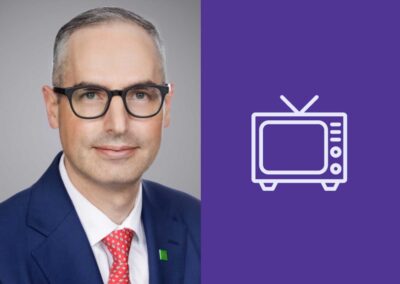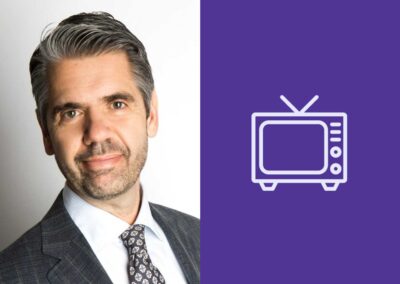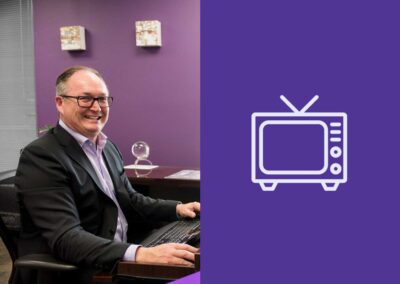This video was conducted in English.
Subtitles and transcripts are available in both English and French, by clicking directly on the CC icon. Click on the settings gear icon or the YouTube icon for more language and subtitle options.
Transcript:
John: I’m here with Ben Gossack from TD Asset Management, he is a managing director and portfolio manager with TD. How are you today Ben?
Benjamin: I’m doing great John. Great to be here and happy to have a discussion with you.
John: And I’m very thankful to have you. You’ve been with TD for how many years now?
Benjamin: So we’re coming up to about 16 years, so I started or basically restarted my career in February of 2009 which was also a tumultuous time for the market but actually a great time to join markets.
John: And you came from another area of expertise prior to joining TD did you not?
Benjamin: That’s correct John, so my background is in engineering and I worked in aerospace with a jet engine manufacturer for about 5 years and it was only there John that I discovered the financial services industry and mutual funds and investments and changed the course of my life.
John: Well yeah, and by the looks of things you manage multiple funds at TD do you not?
Benjamin: That’s correct, yes I do have my hands in a lot of various strategies.
John: How do you keep up to date with market developments and trends, looking after all these funds?
Benjamin: Yeah so there’s there’s always something going on and there’s always a thing that’s happening in the markets, so I do have a fairly disciplined process John, and there’s certain things that I’m looking on a daily perspective or a weekly review perspective, but it’s not as if I have some type of special proprietary information that no one else has. I’m reading the same newspaper reports that people are reading and there might be research that’s given out, there’s internal research within my team and we have you know a pretty tremendous team behind us and a lot of it is also just looking at various prices and then going back and trying to decipher why are certain stocks or certain markets moving a certain way, and that has really you know something that we continue to develop over time and that has sort of fed back into the portfolios.
John: Okay, well I’m going to concentrate on the portfolio that I particularly like and use which is the TD North American Dividend Fund. Can you tell me a little bit about the investment philosophy and strategy for this fund?
Benjamin: So we are well over 15 years managing this fund, we have quite the track record behind us. I’m taking over from the legacy of the first manager, my boss David Sykes, who’s now our chief investment officer. So I took over lead management responsibilities in April of 2022 but I’ve been working on this strategy since 2013 and for us it was always about investing in high quality companies and companies that we believed had growing cash flow streams. So it had to be tied to some type of competitive advantage, some type of growth strategy and I’m happy to, you know, even go a little bit further on what we define as growth, but quality management, quality competitive advantages. And what we were really looking for is free cash flow growth. So this is cash that’s left over from, you know, selling products and services and reinvesting in the business and in particular focused on the companies that can grow their dividends year after year after year after year. Those stocks we have identified to outperform over the long run.
John: And those in investment opportunities must also relate to other areas?
Benjamin: What areas in particular are you looking at John?
John: Well particularly your approach to risk management.
Benjamin: Oh so yes risk management is always part of it. So in terms of what we’re looking for there’s the natural risk metrics people look at – whether it’s you know, tracking error, volatility, beta. The thing that I really do like to focus on is, we typically have less than 50 stocks, we’re always focused on areas of the market that’s growing. In particular, I really like to look at secular trends. So these are trends driven by human activities. So humans may like to travel or they want to do more stuff with AI which means more work in the cloud or maybe they’re taking care of themselves more because they’re getting older so that’s more health care services. So we’re looking at all that and what I really focus on in terms of risk, and I think this is also an important part of our process – is making sure that we haven’t biased the portfolio into any one given growth area. And we did see an example of that recently, with the discovery that there were other AI competitors out there beyond the ones that people have been talking about and we saw lots of stocks across various sectors all fall 10-20-30% all at once. So we care about, you know, how we’ve diversified across whether it’s US or Canada or the various sectors but John more so we really do want to understand each position that we have in the portfolio and their correlation with each other as well.
John: Well that’s very interesting. How does that lead into the history of the fund’s performance?
Benjamin: So the performance has been, you know, very exceptional. If you look at us on the 15-year track record, we’re number one in the category, so we’re first percentile, but even if you look at us whether it’s the 15 year, the 10 year, the five year, we are two-three-fourth percentile, and so that that just shows our philosophy and our process, I guess relative to our peers. The number that I am really keen on is, you know, after fees you know we’re compounding, even just on the 10-year number at 13%. So you can imagine, you know, within the last 10 years, and this includes COVID – all the things that the market worries about in terms of, you know, will stocks continue to go down or can stocks go up – aren’t people worried about, you know, this or that and again focused on quality companies, cash flow compounders, companies that can grow dividends. Over time, it’s that compounding year after year that generates wealth.
John: Sounds like those are your key drivers.
Benjamin: Yes, yes very much so.
John: You know it’s funny, one of the conversations that a lot of people have today with us as advisers is fees. Do you have any performance-based bonuses built into the structure?
Benjamin: So not within the structure. There’s a general fee, so that covers all sorts of expenses I’d say in terms of my personal compensation. We as portfolio managers at TD Asset Management have to own at least one time of our salary in the funds that we manage. So we want to grow with our unit holders as well in terms of our compensation. There is some type of bonus structure tied to our performance so I can assure you John that the performance is the first thing and the last thing and also the middle thing that I’m always thinking about at any given moment in time.
John: Are there any other key members on the investment team that you rely on?
Benjamin: Absolutely and so while I may be speaking to you John and I represent the TD North American Dividend Fund, you couldn’t do it without a village so I have really talented co-managers, Damian Fernandez and David Mau. As well we have a large team of analysts supporting this fund. I have about 21 analysts, and they go from Toronto to Regina to Hong Kong and they cover all the various sectors. We have a team of empirical analysts that are constantly looking at various trends and deciphering the markets to look for opportunities, and there’s a whole host of supporting cast that make sure that cash flow moves here and there, or monitor our risk performance. So it takes an entire village to help generate the returns that that people have experienced.
John: Absolutely, so in this process how would you make decisions on what to keep, what to sell?
Benjamin: It’s a constant iterative process, so I would say as a portfolio manager I have four key decisions John, one is stock selection – so what goes in the portfolio or what don’t we buy. So again, I am filtering many different ideas. You can imagine, I’m always being presented with ideas. So do we already own that, is that an exposure that we already have, could that improve the portfolio or conversely there’s something that we’ve invested in that’s not working. You know what can come off the bench that we’ve been looking at to fit within the portfolio, again being very conscious of making sure that you know if we’re betting on travel, if we’re betting on the cloud, if we’re betting on defense – that we’re properly balancing out all those secular growth drivers. The other would be timing, and I think most people can say timing is the toughest part. When do you buy? When do you sell? And that’s something we’re always trying to improve but that is always the toughest driver. I’d say another key part of our process is sizing the weights of the stocks that we have in the portfolio. That is something that we have built over time and we typically are trying to manage the active weights. So this would be the weight of the holding, the portfolio less the weight in the benchmark and the stock may not be in the benchmark and we’re really keenly focused on that because that helps in terms of delivering the upside performance John, but it also helps to manage the downside performance. And the last thing which is something we’ve been investing in for many years, I like to call it pattern matching, there may be different words for it, but really deciphering through you know why is our stock driving forward or you know the in terms of momentum or why is it not having its momentum? Going back and asking those fundamental questions, I think it’s made us better fundamental analysts to say, you know, these stocks are leading the market, these stocks are being dragged by the market and it’s all four things in concert that help to sort of drive what’s going on in the portfolio.
John: I’m going to ask one last question and then we’ll call it a day. What is the key factor that you think separates you from your peers?
Benjamin: I think there are many different ways to manage money in the markets and I think that’s very exciting and so it is a competitive environment and I think most people have a pretty good funnel in terms of stock selection. I think what has helped over time and differentiated us from the pack is all the stuff that we built in-house. Whether it’s how we size the positions in the portfolio, the pattern matching that I talked about and also the work that we have in terms of the analytical work that our analysts are doing and constantly tweaking and asking questions. And so this is one of these industries where you prove your worth over time and so you know being tops in the category has proven that there is something different going on here versus all the other options that everyone has available to them because it is a free market John.
John: Yes indeed. Ben I would like to thank you for having taken the time to meet with me today to do this interview. I’m going to appreciate it and post it for people to see so that everyone can understand just what it is that Ben Gossak brings to the table versus his competitors and peers.
Benjamin: Yes it’s what our team is trying to deliver day in and day out, and again thank you for your interest and your time in assessing us and how we bring value to your clients John, and we appreciate your support. And again all we want to do is follow the process and compound returns.
John: Well that’s something that we have in common.
Disclaimer:
CEA Wealth Management is a trusted and experienced financial services firm dedicated to helping individuals, families and businesses achieve their financial goals since 1996.
The comments contained herein are a general discussion of certain issues intended as general information only and should not be relied upon as tax or legal advice. Please obtain independent professional advice, in the context of your particular circumstances. This newsletter was written, designed and produced by John A. Leroux, an Investment Funds Advisor with Investia Financial Services Inc., and does not necessarily reflect the opinion of Investia Financial Services Inc.
The information contained in this article comes from sources we believe reliable, but we cannot guarantee its accuracy or reliability. The opinions expressed are based on an analysis and interpretation dating from the date of publication and are subject to change without notice. Furthermore, they do not constitute an offer or solicitation to buy or sell any securities.
Mutual Funds are offered through Investia Financial Services Inc. Commissions, trailing commissions, management fees and expenses all may be associated with mutual fund investments. Please read the prospectus before investing. Mutual funds are not guaranteed, their values change frequently, and past performance may not be repeated.



